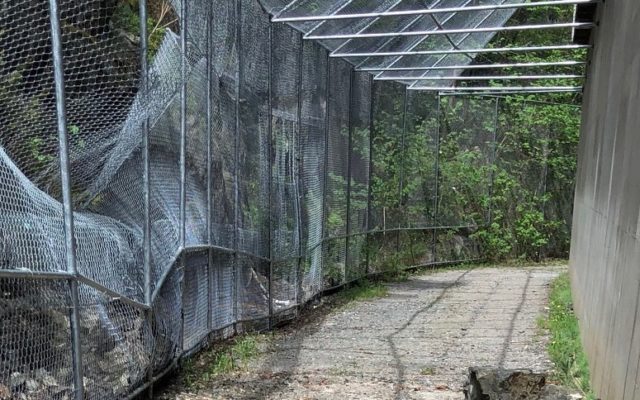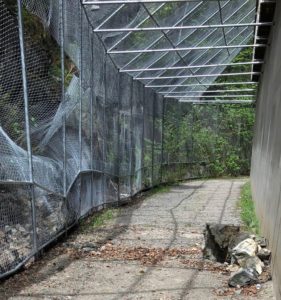
Popular West Branch rapids inaccessible to rafters after rock slide
An April rock slide at McKay Station, a hydroelectric dam owned by Brookfield Renewable, has forced the company to shut down a path to the West Branch of the Penobscot River that allows whitewater rafters and other recreational users to access some of the rapids of Ripogenus Gorge. The company announced this week that it is working on a long-term plan that should provide a new trail that would open in 2021.
According to a Brookfield Renewable news release, after the April 14 rock slide in T3 R11, northwest of Millinocket, the company sought outside opinions on what should be done.

Photo courtesy of Brookfield Renewable
BLOCKING ACCESS — In mid-April a rockslide, estimated at 700 pounds, occurred off the vertical bedrock wall breaking through the protective chain link fence with portions of rocks landing within the walkway used for river access at McKay Station.
“A third-party geotechnical engineer inspected the rock face along the walkway behind McKay Station, and the findings from the geological assessment determined that portions of the rock face are heavily fractured and are at risk of becoming dislodged and toppling without warning,” the company said. “Brookfield Renewable reviewed these findings with the Federal Energy Regulatory Commission, and a determination was made to close the river access for the season, as the current situation poses an unacceptable public safety hazard.”
Until then, raft access will be provided about one-half mile downriver from McKay, at Chewonki’s Big Eddy Campground through their property at Little Eddy.
Matt Polstein, owner of New England Outdoor Center, which offers guided raft trips on the river, said about half of the rapids normally encountered on a trip through Ripogenus Gorge are not accessible.
“The Gorge proper — the rapid known as ‘The Exterminator’ and the rapid known as ‘The Staircase’ [are inaccessible] for the summer,” Polstein said.
But Chewonki is letting rafters use an old path to the river to create an alternative launching site. That new site lets rafters access the “Troublemaker” and “Cribworks” rapids.
“We lost about half at the top, but we’ve still got some great rapids to run up there,” Polstein said.
And rafters aren’t the only people who typically access the gorge. Fly fisherman John Kirk enjoys visiting the West Branch, and often targets that stretch of water.
“[This is a] pretty big [deal],” Kirk said. “It’s a good spot. A consistent dry fly spot that can give you a shot at a really big fish.”
Kirk said that unlike rafters, fishermen do have other ways to access the gorge. They’re just not as desirable.
“[It’s] less safe access. McKay is easy access. It requires minor effort and is productive,” Kirk said. “But this is less of an issue for anglers than rafters.”
Miranda Kessel, the manager of stakeholder relations, said a 700-pound boulder rolled down the hill and punctured a restraining fence.
She said the company has a long history of providing access to the river at McKay Station, and was pleased that stakeholders stepped forward to provide some form of access for this summer.
“While we were very disappointed with the outcome to temporarily close the river access at McKay Station for the 2020 season, we’re very grateful for the cooperation from local rafting outfitters, private boater representatives and neighboring landowners to help identify an interim access at Chewonki’s Big Eddy Campground through their property at Little Eddy,” Kessel said. “Neighboring landowners, the Chewonki Foundation and Katahdin Forest Management were essential to establishing this plan.”